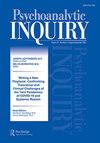离家:普罗科菲耶夫的《彼得与狼》
IF 0.5
4区 心理学
Q3 PSYCHOLOGY, PSYCHOANALYSIS
引用次数: 0
摘要
本文将探讨我将音乐概念化的一些方式,因为它与“家”的概念有关,特别是在这里,关于离开家。我将利用作曲家谢尔盖·普罗科菲耶夫著名的作品《彼得与狼》中的音乐,说明彼得在离开童年花园之家时逐渐融入和巩固自己的身份。因此,对音乐本身的分析作为精神分析数据的主要来源是我在跨学科探索中所采用的独特分析方法。普罗科菲耶夫的代表作《彼得与狼》涉及以下主题:音乐和精神分析的概念具有持久的价值,因为它们相互通知并丰富了对方。音乐是进入情感和无意识过程的重要入口。音乐和精神分析的原则在音乐厅和咨询室内外都是相关的,有助于对我们内心生活的细微理解。本文献给我的大孙女莎拉·埃丝特·刘易斯,在我写这篇文章的时候,她刚刚离开家,成为一名大学新生;同时献给我们最小的孙女雷切尔·乔达娜·刘易斯,在本文完成的时候,她也即将离开家,开始上大学。披露声明:本文是我在《文化动物园》(S. Akhtar and V. Volkan,编辑)2005年国际大学出版社(不再出版)中“动物、音乐和精神分析”章节的修订版,以及我在《心灵的旋律》(2013年,Routledge)一书中出版的“自尊-彼得和狼”章节的修订版。作者简介:julie Jaffee Nagel博士毕业于茱莉亚音乐学院、密歇根大学和密歇根精神分析研究所。她是《心灵的旋律》(劳特利奇出版社)的作者,《管理怯场:音乐家和音乐教师指南》(牛津大学出版社),以及刚刚出版的《超越流行病的音乐职业选择:音乐和心理视角》(罗曼和利特菲尔德)以及主要精神分析期刊的出版物。她在国内和国际上展示了她的作品。内格尔博士在密歇根州安娜堡市从事心理治疗和精神分析方面的私人执业。本文章由计算机程序翻译,如有差异,请以英文原文为准。
Leaving Home: Prokofiev’s “Peter and the Wolf”
ABSTRACTThis article will explore some of the ways I conceptualize music as it pertains to the concept of “home,” and specifically here, about leaving home. Using composer Sergei Prokofiev’s music in his well-known beloved composition, Peter and the Wolf, I will illustrate the gradual integration and consolidation of identity in the eponymous character, Peter, as he left his childhood garden home. Thus, the analysis of music itself as a primary source of psychoanalytic data is the distinctive method of analysis that I bring to my interdisciplinary explorations. Prokofiev’s masterpiece Peter and the Wolf pertains to the following overdetermined themes: Music and psychoanalytic concepts hold enduring value as each informs and enriches the other. Music serves as an important entry into affect and unconscious processes. Music and psychoanalytic principles are relevant both inside and beyond the concert hall and consulting room and contribute to a nuanced understanding of our inner lives.KEYWORDS: Psychological developmentErik Eriksonindividuationmusical themesaffectsinstrumentationorchestrationProkofievPeter and the Wolf AcknowledgmentsThis paper is dedicated both to my oldest granddaughter, Sarah Esther Lewis, who just left home to become a college freshman as I was writing this article, and to our youngest granddaughter, Rachel Jordana Lewis, who is about to leave home to begin college as this paper is completed.Disclosure statementThis article is a revised version of my chapter “Animals, Music, and Psychoanalysis” in The Cultural Zoo (S. Akhtar and V. Volkan, Eds.), 2005, International University Press (no longer publishing), and in the revised chapter, “Self Esteem – Peter and the Wolf” which was published in my book Melodies of the Mind, 2013, Routledge.Additional informationNotes on contributorsJulie Jaffee NagelJulie Jaffee Nagel, Ph.D., is a graduate of The Juilliard School, The University of Michigan, and The Michigan Psychoanalytic Institute. She is the author of Melodies of the Mind (Routledge Press), Managing Stage Fright: A Guide for Musicians and Music Teachers (Oxford University Press), and the just published Career Choices in Music Beyond the Pandemic: Musical and Psychological Perspectives (Rowman and Littlefield) as well as publications in major psychoanalytic journals. She has presented her work nationally and internationally. Dr. Nagel has a private practice in psychotherapy and psychoanalysis in Ann Arbor, Michigan.
求助全文
通过发布文献求助,成功后即可免费获取论文全文。
去求助
来源期刊

Psychoanalytic Inquiry
PSYCHOLOGY, PSYCHOANALYSIS-
CiteScore
1.00
自引率
33.30%
发文量
65
期刊介绍:
Now published five times a year, Psychoanalytic Inquiry (PI) retains distinction in the world of clinical publishing as a genuinely monographic journal. By dedicating each issue to a single topic, PI achieves a depth of coverage unique to the journal format; by virtue of the topical focus of each issue, it functions as a monograph series covering the most timely issues - theoretical, clinical, developmental , and institutional - before the field. Recent issues, focusing on Unconscious Communication, OCD, Movement and and Body Experience in Exploratory Therapy, Objct Relations, and Motivation, have found an appreciative readership among analysts, psychiatrists, clinical psychologists and a broad range of scholars in the humanities.
 求助内容:
求助内容: 应助结果提醒方式:
应助结果提醒方式:


